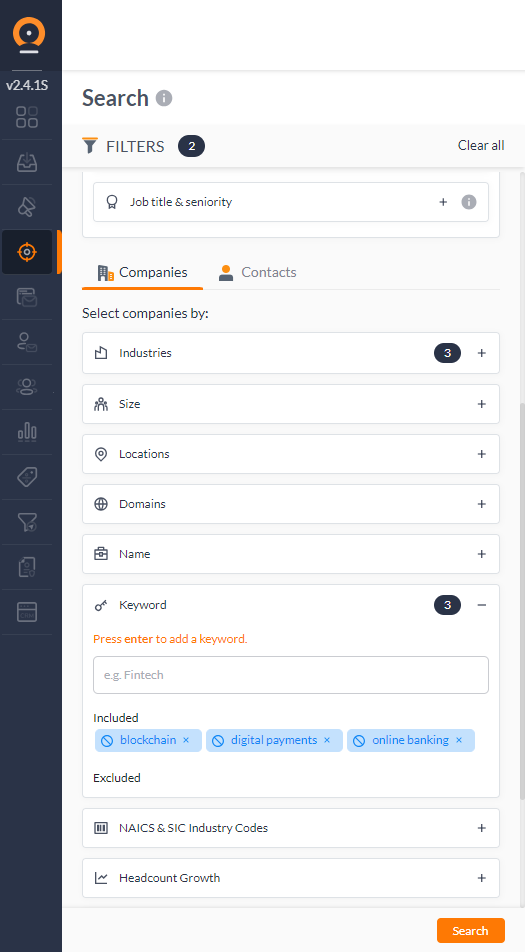Understanding the Keywords Filter
The keyword filter in Outbase is a powerful data point for refining your target audience, helping you perform an effective keywords search by identifying specific terms within company descriptions and names. Whether you’re targeting Fintech companies or any other sector, using precise keywords can significantly enhance the accuracy of your search and yield more relevant results.
Best Practices for a Successful Keywords Search
1. Be Specific but Not Too Narrow with your Keywords Search
Finding a balance between specificity and breadth is crucial when conducting a keyword search. Keywords that are too broad can include irrelevant companies, while overly narrow terms might exclude potential prospects.
For example, instead of using the keyword “financial,” consider terms like “blockchain,” “digital payments,” or “online banking” to refine your search within the Fintech industry.

2. Understand Your Target Audience’s Language
To effectively use keywords, understanding the terminology your target audience uses is essential. Research industry jargon, common phrases, and emerging trends within the sector. This approach ensures that the keywords you select align with how companies describe themselves and their services, optimizing your keywords search.
3. Use Variations and Synonyms for your Keywords Search
Incorporate different variations and synonyms of your primary keywords. This strategy covers a broader spectrum of potential companies that might use different terms to describe similar services. For instance, along with “Fintech,” consider using “financial technology,” “financial innovation,” and “digital finance.”
For those targeting the tech industry, using keywords like “AI,” “artificial intelligence,” “machine learning,” and “deep learning” can help you capture a wider range of companies that might be relevant to your needs.
4. Test and Refine Your Keywords
The effectiveness of keywords can vary over time and across different campaigns. Regularly review and test your keywords to see which ones yield the best results. Use data from previous campaigns to refine your keyword list, focusing on those that consistently help you reach the right audience in your keywords search.
Implementing Keywords Search in Outbase
1. Setting Up Your Keyword Filters
To set up your keyword filters in Outbase, navigate to the filtering options within our Search tool. Enter the keywords you have selected into the keywords filter. The system will scan company descriptions and names to find matches, helping you create a focused list of companies.
2. Excluding Keywords
Outbase also provides the option to exclude specific keywords. This feature is particularly useful when you want to avoid certain types of companies within a broader industry. For instance, if you are targeting the Marketing and Advertising industry but want to exclude agencies, you can add “agency” as an exclusion keyword. This way, companies that mention “agency” in their descriptions or names will not appear in your list.
3. Combining Keywords with Other Filters
Keywords work best when combined with other filters such as industry, company size, and location. This multi-faceted approach ensures that your list is not only relevant but also tailored to your specific outreach strategy. For example, targeting “blockchain” within “financial services” companies located in North America provides a more targeted list than using either filter alone.
4. Analysing and Adjusting Your Lists
After generating your list, analyse the results to ensure they meet your expectations. Look at the company descriptions to verify that the keywords are bringing in the right types of businesses. If necessary, adjust your keywords and re-run the filter to improve accuracy.
Common Pitfalls in Keywords Search to Avoid
1. Overloading with Keywords
Avoid the temptation to add too many keywords at once. This can dilute your filter’s effectiveness and produce a too-broad list. Start with a few well-chosen keywords and gradually expand as needed.
2. Ignoring Keyword Performance
Regularly monitor the performance of your keywords. If certain keywords are not yielding relevant results, don’t hesitate to remove or replace them. Keeping an eye on keyword performance ensures that your lists remain precise and relevant.
3. Neglecting to Update Keywords
Industries evolve, and so does the language used within them. Periodically update your lists with new keywords to reflect new trends and terminologies. Staying current with industry language helps maintain the relevance and effectiveness of your targeting.
Conclusion
Using keywords effectively in your Outbase lists can transform your prospecting efforts, making your campaigns more efficient and successful. By understanding your audience, selecting the right keywords, and continually refining your approach, you can ensure that your lists are targeted and relevant. Start implementing these best practices today to take full advantage of Outbase’s powerful keyword data point.



